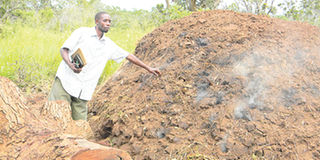New tech to limit the use of wood fuel

Mpiji Station village chairman Said Mwenyegoha shows journalists a charcoal kiln in his village. Charcoal burning is responsible for the destruction of vast tracts of prime forestry in Pwani and its environs. PHOTO | SYLIVESTER ERNEST
What you need to know:
- Tanzania has not been left behind in the struggle to keep the environment safe with departments being set up to play a coordinating role while local and international organisations soliciting for funds to further the cause.
Kibaha. With the world yet to come to grips with the ever-increasing rate of environmental degradation- forest destruction in particular groups and individuals have been pursuing efforts that could minimise impacts that come with the practices.
In the process, some technologies have been employed, with governments also putting in place policies, laws and by-laws to minimise the impacts and prevent people from causing more harm to the environment.
The efforts however, have not gone smoothly, especially as practices that lead to environmental destruction are directly linked to human activities.
It has been difficult for the people to discard such behaviour which has become a stumbling block to conserving the environment.
On the other hand, in most cases poverty has dented the efforts and because of lack of funds and proper farming methods, agricultural practices contribute greatly to environmental degradation.
Lack of money to finance the use of alternative sources of energy leave most people with no option but to use charcoal and wood.
Tanzania, as are other countries, has not been left behind in the struggle to keep the environment safe, with departments being set up to play a coordinating role while local and international non-governmental organisations have been soliciting for funds from different sources to ensure the campaign continues.
The Coast Region is among areas in Tanzania which have enormous wealth of forest cover, which unfortunately have found their existence threatened as different people illegally exploit it for different uses.
Officials in Kibaha District decry the ever-increasing number of large-scale farmers who clear land for farming purposes thus perpetrating deforestation.
“Of late, we have witnessed a number of large-scale farmers who are now posing a threat to forests...some leaders in the district and village levels are selling forest land at will. This has to change,” says Mr Bakari Mohamed, the acting manager of the Tanzania Forest Service Agency (TFS), for the Eastern Zone.
On the other hand, locals continue to cut down trees to get timber, wood fuel and charcoal, contributing greatly to deforestation.
The continued use of charcoal from Kibaha District and the entire Coast Region is said to be as a result of great demand by many people, especially in the nearby commercial city of Dar es Salaam where most of its residents lack an alternative source of energy.
Locals also cut trees to get wood for domestic purposes. The felling of trees for charcoal happens even with local residents knowing the impact associated with the act. However, they are motivated by the lack of another source of energy.
But there is now a sense of optimism that forests will now be conserved, thanks to an initiative by a national project - Mama Misitu.
The project is aimed at building public, private and non-governmental partnerships and networks related to sustainable use of forests and timber products.
Mama Misitu, in conjunction with other interested parties in environmental conservation like the Tanzania Traditional Energy Development and Environmental Organisation (TaTEDO), have encouraged people in the district to employ the use of alternative charcoal made from dry grass to reduce dependence on wood.
“It is an initiative aimed at reducing the way trees are felled to get wood for domestic purposes,” said Kibaha District acting forest officer, Dunstan Kanyenye.
He was speaking to members of the Journalists Environmental Association of Tanzania (JET) who had paid a visit to Kibaha District to see how the local communities were involved in forest conservation and whether they could get any benefits from the process.
Mr Kanyenye said the grass charcoal made in a kiln is more effective and, if adopted by all people residing around the forests, would help greatly in reducing the amount of trees being cut for domestic purposes.
The tunnel built at Misufini area in Kibaha District, according to the forest officer, can produce up to seven sacks of charcoal.
The technology has helped residents of Soga and Vikuge villages in Soga Ward to reduce the use of wood for domestic purposes thus leading to conservation of otherwise threatened forests.
“As a district we are working very hard to encourage everyone to use this new technology...we have been sending facilitators to help the villagers on how to make the environment-friendly charcoal,” said Tatu Selemani, the Kibaha District executive director.
Despite this noble task of making sure villagers get used to alternative sources of energy, the DED laments that there is lack of enough personnel to traverse different parts of the district to educate residents on the need to protect the environment.
The use of the charcoal comes as a result of Mama Misitu insistence on promoting participatory forest management processes so that communities can increase their rights over land and forests as well as strengthen their capacity to sustainably manage such resources.
Currently Mama Misitu works in eight districts in a project that runs for five years (2012 – 2016).
Throughout this programme, there will also be a focus on national level engagement, where Mama Misitu hopes to raise public awareness on the value of forests and their sustainable management to the nation.
This is done through JET-the Journalist Environment Association of Tanzania with its members traversing different areas to raise awareness on the importance of conserving the environment.
This is to ensure that locals can benefit from their participation in conserving the environment.




